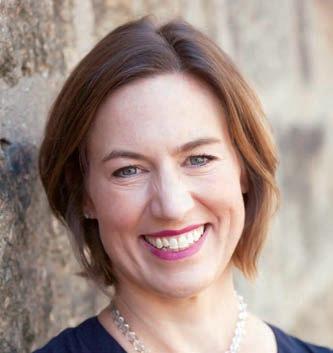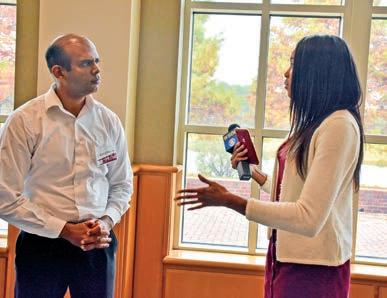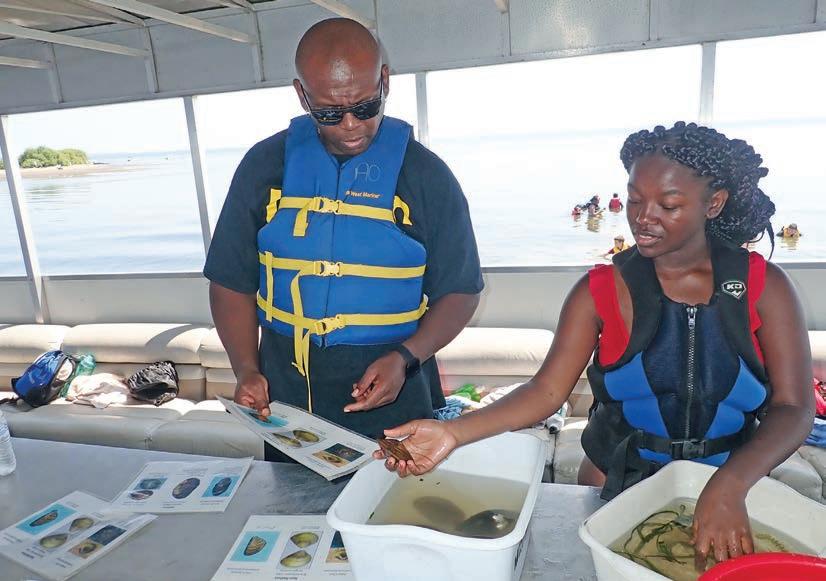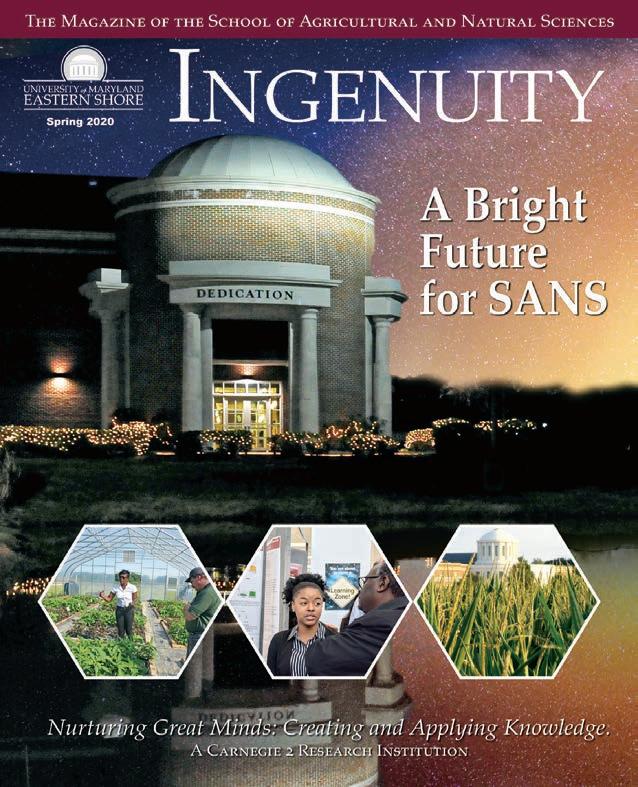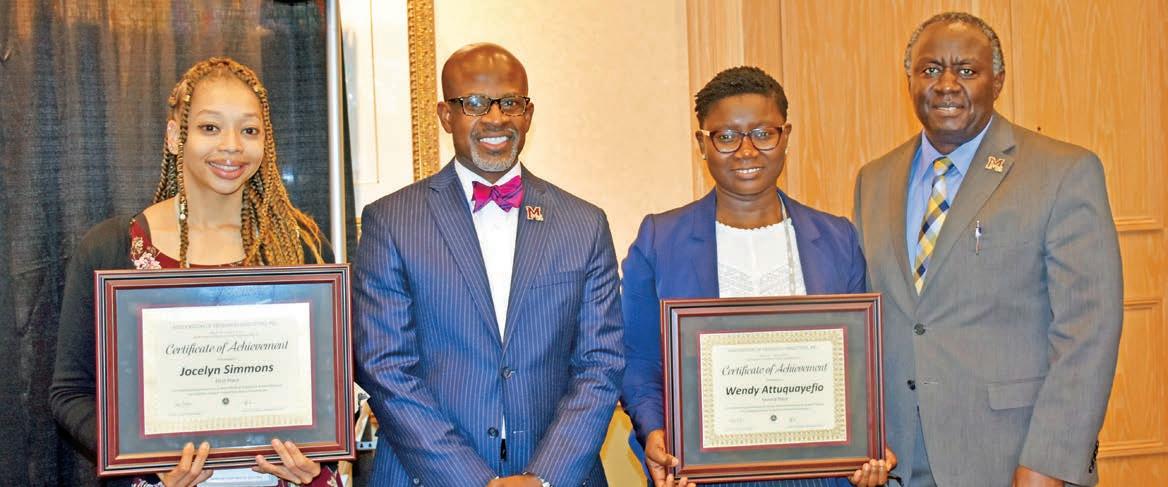
7 minute read
Graduate Research and Scholarship
UMES Faculty and Graduate Students Win ARD Awards
UMES graduate students, from left, Jocelyn Simmons and Wendy Attuquayefio, took first and second place ARD awards, respectively, for their posters. Pictured with them are Dr. Rondall Allen, second from left, dean, School of Pharmacy and Health Professions, and Dr. Moses T. Kairo, right, dean, School of Agricultural and Natural Sciences.
Representing UMES, one faculty member and two graduate students came away from the 19th Biennial Association of Research Directors Research Symposium in Jacksonville, Fla. with top awards. Some 700 researchers from the 1890 Land-Grant Universities attended.
Jocelyn Simmons’ poster titled, “The Efficacy of a Field Collected Fungal Pathogen against Stinkbugs,” won first place in the graduate student poster presentation for outstanding achievement in plant health and production, and plant products. Wendy Attuquayefio won second place in the graduate student poster presentation for outstanding achievement in animal health and production, and animal products. Attuquayefio presented two posters titled, “Effects of Oxidized Diet on Plasma Oxidative Stress, Postmortem Muscle Metabolism, and Meat Quality Properties of Broilers,” and “Effects of Heat Stress on Broiler Productivity and Postmortem Glycolysis and Quality Properties of Broiler Breast Meat.”
The two were among 236 undergradu ate and graduate students competing in the poster competition with 68 r eceiving awards. Students also competed in oral presentations. Dr. Salina Parveen, a professor with over 27 years of experience in teaching, research, and outreach service associated with food
safety, water quality, and food and environmental microbiology, received the ARD’s highest honor. In addition to the MorrisonEvans Outstanding Scientist Award, a cash prize of $1,000, was presented to her during the symposium’s closing ceremony. The award is in honor of Dr. Richard D. Morrison, president emeritus of Alabama A&M University, and Congressman Frank E. Evans of Colorado.
Parveen has spent the past 17 years at UMES teaching graduate level courses in food science and technology. She has also trained more than 100 graduate, undergraduate, and high school students; some 30 educators and scientists; eight technicians; and five postdoctoral associates and/or visiting scholars. As a researcher, she has addressed regional, national and international issues of food safety and quality. Her grantsmanship has won her more than $13 million of competitive funding that supports her scientific inquiry as well as the training she gives.
She has published three book chapters; over 150 abstracts in scientific meetings for local, national, and international audiences; 54 manuscripts in both nationally and internationally recognized peer-reviewed journals, and has been invited to give 60 presentations. Additionally, her students have won more than 15 awards as oral or poster presenters. Parveen also serves on several national and international scientific committees and as an editorial board member for many peer-reviewed journals.
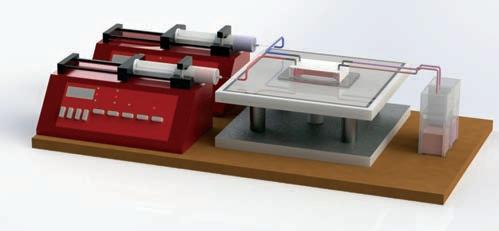

Getting accepted to an Ivy League school is a dream come true; having them pursue you is even better. That’s just the position in which Ayobami Ogunmolasuyi, an engineering major with a mechanical specialization fr om Nigeria and a recipient of a Louis Stokes Alliance for Minority Participation fellowship, was fortunate to find himself.
Following his December 2019 graduation from UMES, Ogunmolasuyi is now an engineering sciences Ph.D. student in the Thayer School of Engineering at Dartmouth College. Dartmouth of fered the UMES student a full scholarship and stipend to attend the prestigious institution.
Ogunmolasuyi was “discovered” when he attended an Annual Biomedical Research Conference in Indianapolis in November 2018. There he presented his research “Numerical Simulation of Fluid Flow and Mixing in Microchannels” that he conducted under the lead of Dr. Kausiksankar Das, associate professor of physics.
Microfluidics, the study of fluid flow and mixing in microchannels, has various applications, Ogunmolasuyi said, the most important of which ar e the functional organs on a chip. “These are functional human organs on a microchip that includes the kidney-on-a-chip and lungs-on-a-chip for testing drugs,” he said. “The bottleneck that the microfluidics industry faces, he said, is the inability of fluids to perfectly mix in these channels due to the miniature size of the mixing chamber, which is where our lab steps in.” He said they are exploring methods such as periodic slip and no slip boundary conditions, and baker’s transformation to derive an efficient mixing technique for fluids in microchannels.
After the conference, a representative of the school reached out to Das and said they wanted to talk to Ogunmolasuyi about an opening in the lab ther e. Ogunmolasuyi had been in conversation with them since and was invited to visit Dartmouth in August.
“It’s a funny story,” Ogunmolasuyi said. “I will be working with the senior associate dean of the Thayer School of Engineering on Ice Mechanics research, which was not the original person that contacted me. He snatched me fr om him.” His mentor couldn’t be prouder. “Achieving that feat (getting accepted to an Ivy League graduate school) from UMES shows that our students have the talent and potential to reach any peak of excellence in their career,” Das said. “I have no doubt that in the future Ayobami will continue to achieve more laurels and make us proud. Congratulations and best wishes.” Fluid Flow Research Pays Off
Book Chapter Expounds on Simmons’ Research
Jocelyn Simmons, a food and agricultural sciences graduate student, co-authored Chapter 14, “Plant Growth-Promoting Rhizobacteria-Induced Defense Against Insect Herbivores,” in the book “Field Crops: Sustainable Management of PGPR.” Dr. Simon Zebelo, an associate professor of entomology and plant biology in UMES’ Department of Agriculture Food and Resource Sciences, and Joseph Disi, Department of Entomology, University of Georgia, were the other authors.
The 17-page chapter focused on PGPR-induced defense against insect pest in field crops with emphasis on the mechanism of action involved against insect pests. It examined PGPR-mediated biochemical and physical changes in the host plant that display insect pathogenicity, methods mixtures application, and challenges associated with their use of PGPR in sustainable agriculture. The findings show that growth-promoting rhizobacteria improve plant health and productivity by providing protection from diseases and pests and enhancing growth. “PGPR induce systemic resistance against microbial pathogens and herbivorous insects,” Simmons said.
“PGPR are important to farmers and the environment because it is an alternative way to combat chemical applications, which
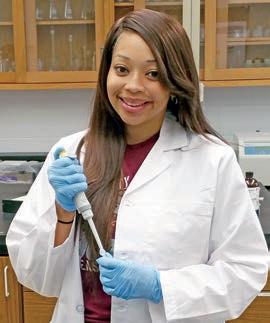
INGENUITY | SPRING 2020 23 have detrimental effects to the ecosystem, beneficial insects, and the environment,” Simmons said. “PGPR enhances crop production by being able to self-replicate and improve productivity and fertility of desired crops.” Simmons has received awards for her master’s research while serving as the Graduate Student Government president. She is currently studying how to use PGPR to control corn earworm, one of the key insect pests of sweet and field corn. Simmons’ master’s thesis generated interesting data on how to use entomopathogens (fungi), a disease that is only detrimental in insect pests that can affect the mortality rate of insects pests such as stinkbugs. She is preparing to submit her results for publication.
“Researching about ways of sustainable agriculture has influenced Miss Simmons to find more innovative ways to tackle these dilemmas, which is where this book chapter and her master’s degree were introduced,” Zebelo said.
Johnson appointed to White House subcommittee

Zoe Johnson, a graduate student pursuing a doctorate in toxicology at UMES, was recently appointed to the President’s Council of Advisors on Science and Technology subcommittee on Students, Postdoctoral Education, and Early Career Professionals. “It’s an honor to be appointed and serve at the highest level of science and technology policy-making in our nation,” Johnson said. “The subcommittee is the first of its kind and I’m challenged to be one of its trailblazers.”
The Council is an advisory group of “the nation’s leading scientists and engineers, appointed by the President to augment the science and technology advice available to him from inside the White House and from cabinet departments and other federal agencies.” It is consulted about and often makes policy recommendations “concerning the full range of issues where understandings from the domains of science, technology, and innovation bear potentially on the policy choices before the President.” The Council is administered by the White House Office of Science and Technology Policy.
Johnson has also served as an ambassador with the White House Initiative on HBCUs for the past 3 years and was recognized during its 2019 Annual HBCU Week Conference in Washington, D.C. He received a student recognition award as part of the group’s Excellence in Innovation and Competitiveness Awards.
Johnson, former pr esident of UMES’ Graduate Student Council, is poised to defend his dissertation next fall. His research focuses on understanding the cellular and molecular mechanisms of environmental toxicants that play a role in the etiology of neurodegenerative disorders and terms neuroprotective strategies for neurodegeneration. In layman’s terms, he is studying promising approaches to attenuating Parkinson’s disease processes in the laboratory.



